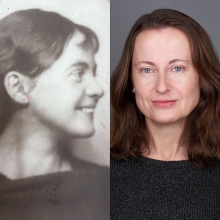Emily Wilson Endows a Fund to Support Students

Emily Wilson, College for Women Class of 1963 Term Professor in the Humanities, made a gift to endow a fund supporting students enrolled in the post-baccalaureate program in the Department of Classical Studies. The Elsie Phare Fellowship will provide tuition support for a student from a group underrepresented in classical studies.
Penn’s post-baccalaureate program in classical studies prepares students to enter doctoral programs in classical studies, ancient history, and related fields. It is the oldest classical studies post-baccalaureate program in the country and has historically been a bridge for people from a variety of backgrounds to gain access to advanced study and professional opportunity.
Wilson comments on the importance of diversity, “Classical studies and ancient history as fields are historically and presently extremely white and dominated by people with certain kinds of privilege. If everybody who's in the field of study is more or less the same demographically, we can get into stale narratives. In terms of intellectual life, as well as social justice, there needs to be a lot more diversity than there is.”
Peter Struck, Professor and Chair of Classical Studies, says, “Increasing the intellectual diversity in our field is a priority. Emily’s generous gift promises to have an outsized impact on future generations who study the ancient Mediterranean and the many and complicated ways it continues to influence our world.”
Wilson named the fund after her grandmother, Elsie Phare who was one of the first generation of women to study at University of Cambridge, in an era when the University did not grant women degrees. “My grandmother came from a working-class background,” says Wilson. “Without a scholarship, she would not have had access to an educational experience that was transformative for her. I’d like the Elsie Phare Fund to create a new path for people, like her scholarship did for her.”
Phare went on to be a writer and teacher and was awarded Cambridge’s Seatonian Prize for religious poetry in 1935 and 1939. Her translation of Molière's The Misanthrope was performed in London in 1937 and she was a leading contributor to the study of the poet Andrew Marvell.
Wilson has been teaching at Penn since 2002 and is the graduate chair of the Comparative Literature and Literary Theory program. Her 2017 translation of Homer’s Odyssey received widespread acclaim and she was named 2019 MacArthur Fellow by the John D. and Catherine T. MacArthur Foundation. She earned her Ph.D. in classics and comparative literature from Yale University, and her master’s and bachelor’s degrees from Oxford University.





